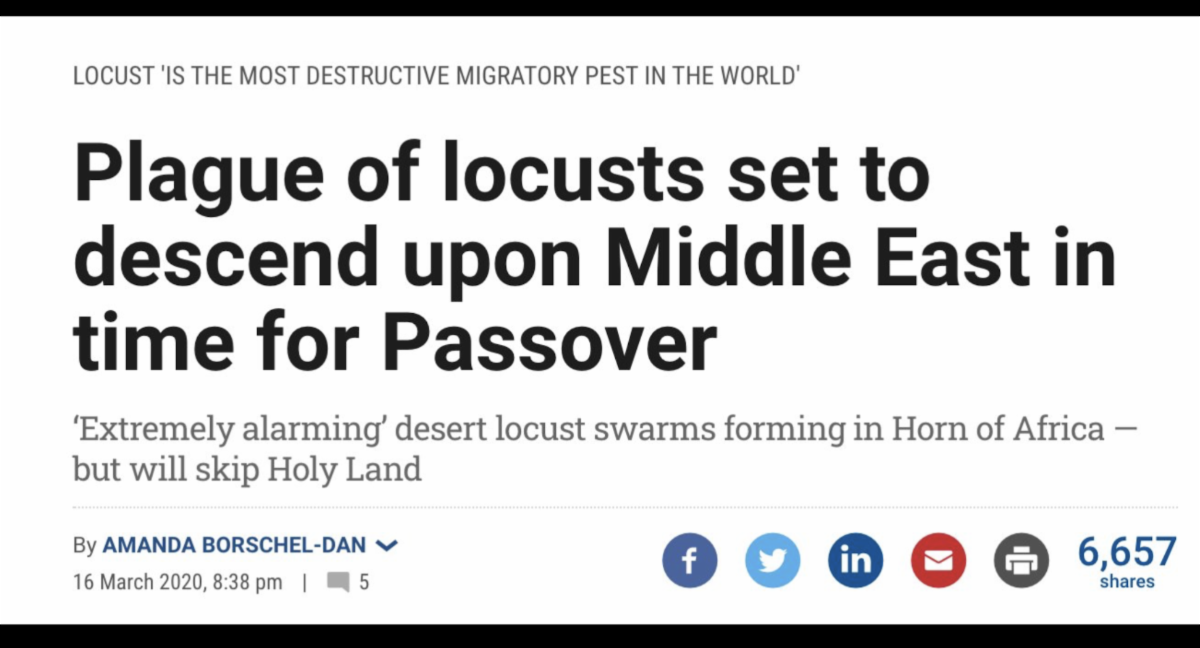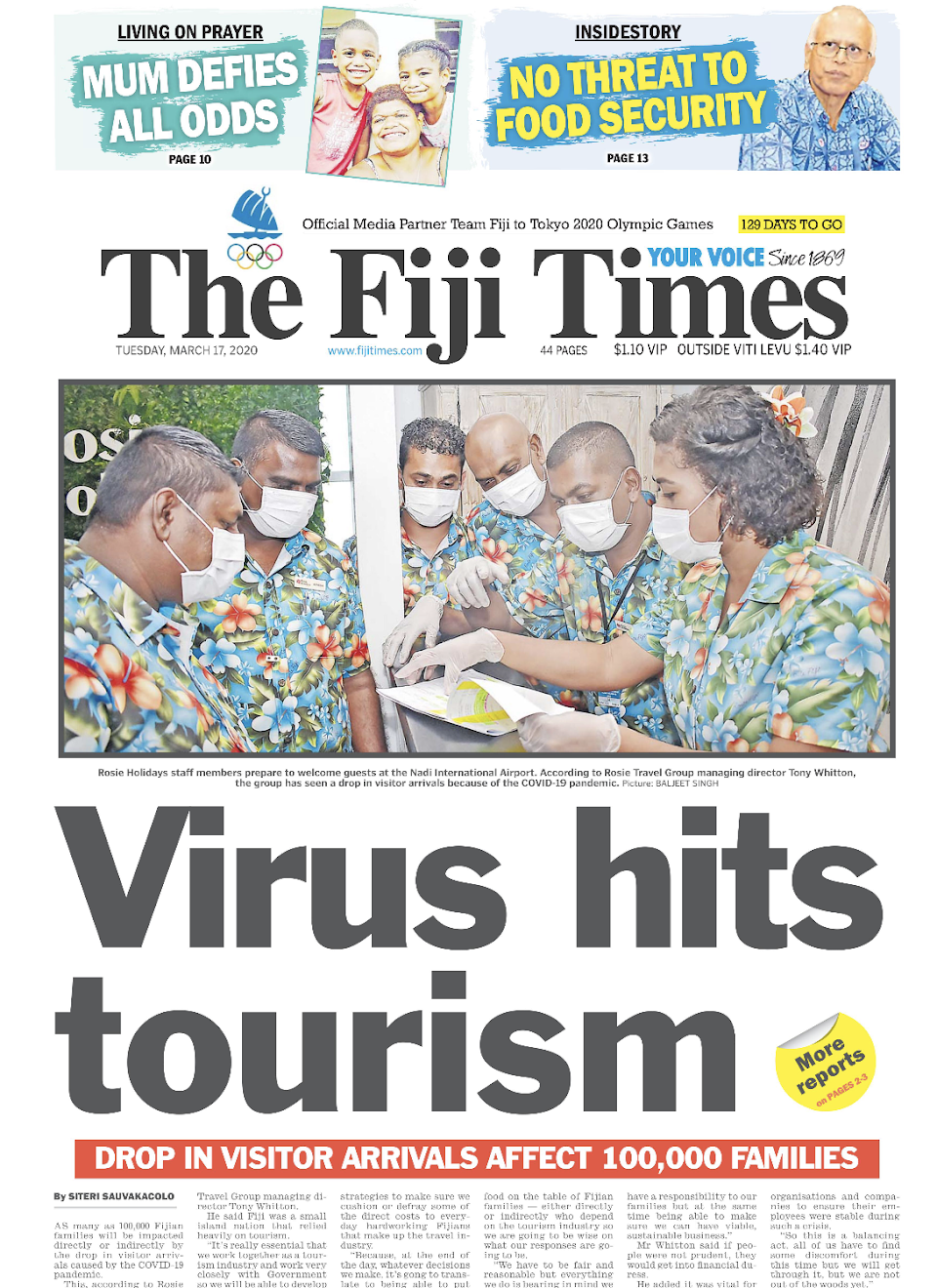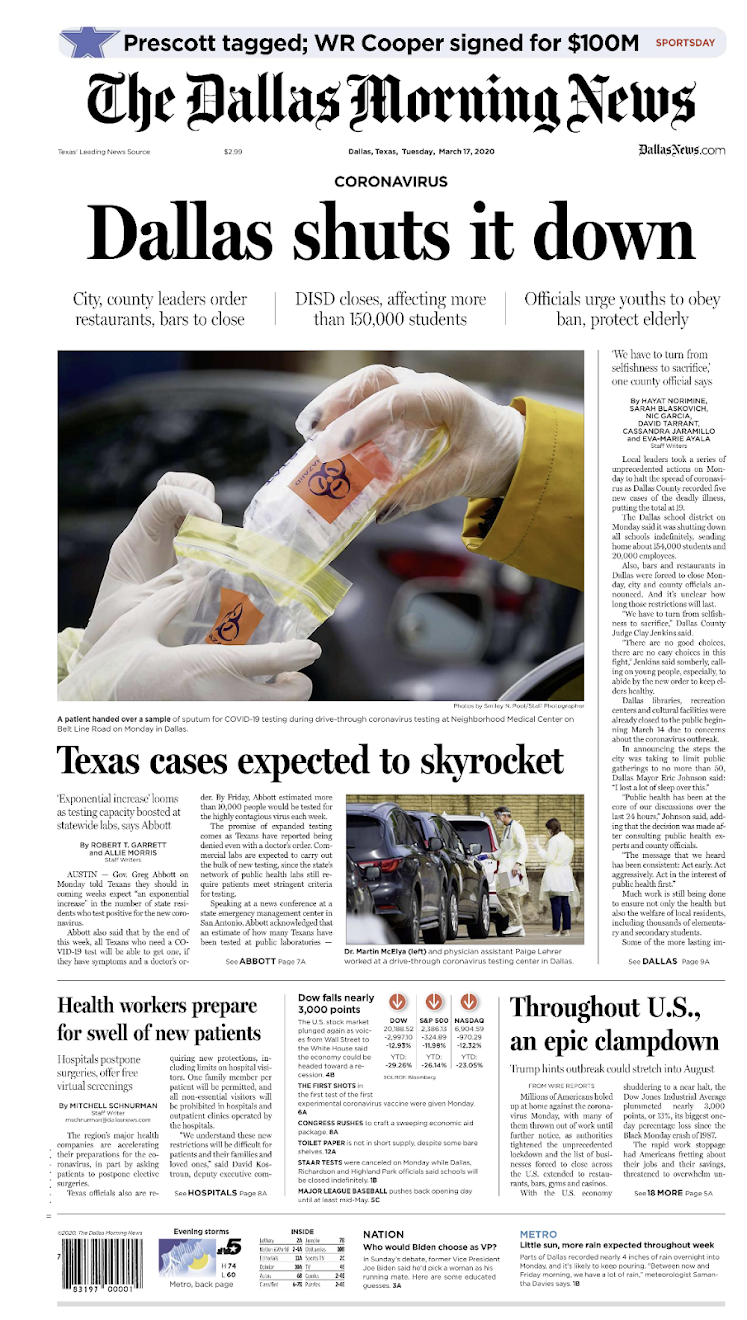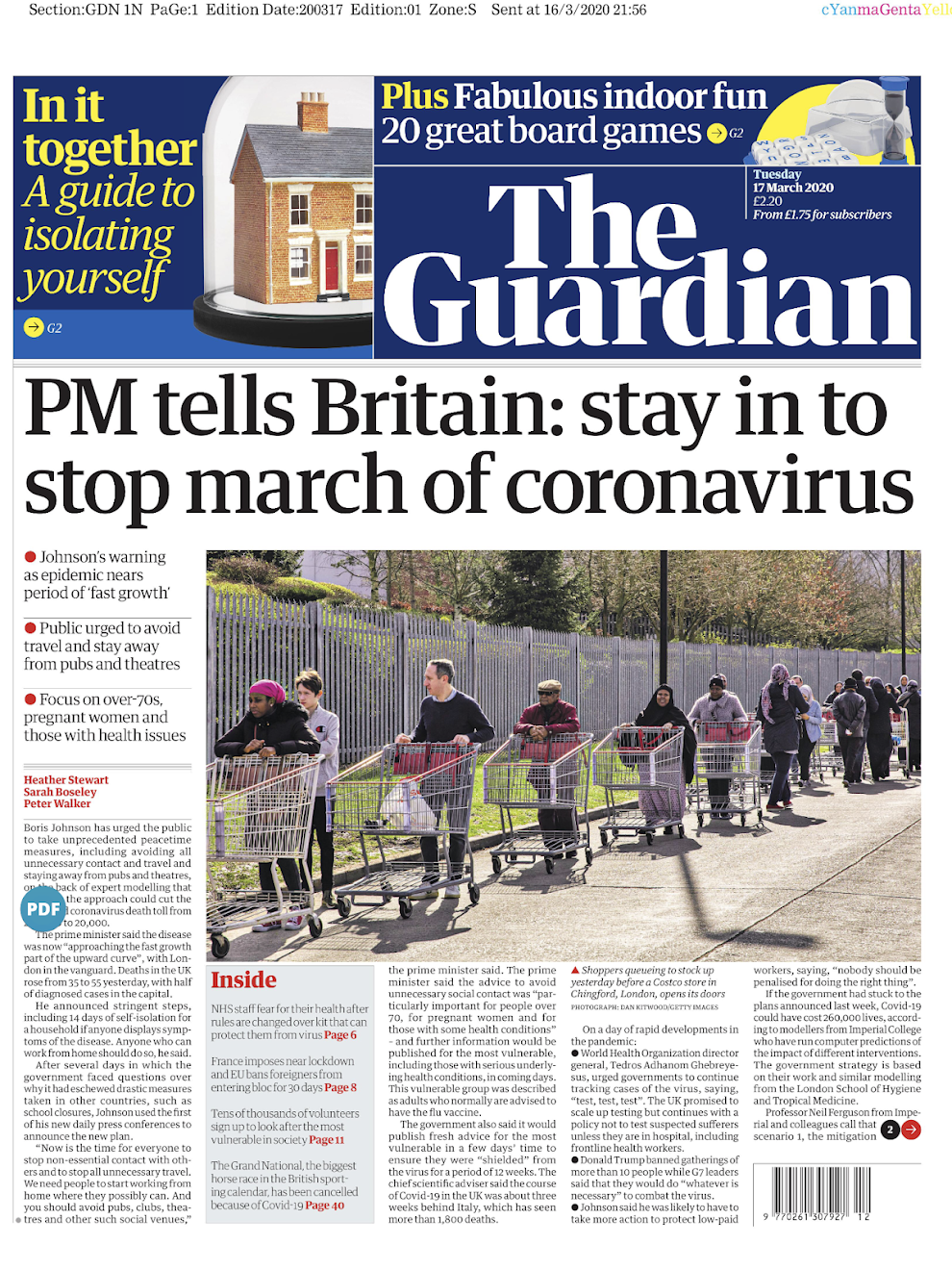From the Rabbi's Bunker
From our office staff....

"...It's lonely - working, but keeping our distance. At least the office is clean!"
And in the unlikely event that you haven't seen this one yet...
OK - so this is a REAL HEADLINE, from Times of Israel!

Enough Already! DAYENU!!!
Program Notes:
- YOU ARE CORDIALLY INVITED TO OUR FIRST VIRTUAL CONGREGATIONAL CHAT - WED. AT NOON - SIMPLY CLICK ON THIS LINK - https://zoom.us/j/934772252 - AND IT WILL TAKE YOU THERE.
TOPIC: Whatever you want, with a focus on some of the ethical issues of the epidemic and social distancing.
- Also, join us for an abridged, musical Kabbalat Shabbat service on Friday at 6, led by Beth Styles and myself. Just go to https://www.tbe.org/tbe-live/ (TBE Live - on our website), sit back and enjoy. Click here for a pdf of Kabbalat Shabbat services
Tuesday, March 17
"Don't Separate from the Community"...or not?
If this were a blizzard, this would be around the time when we would be seeing the snow start to melt - or at least be piled so high on the sides of the road that we would be able to pass. Even if this were a hurricane, like Sandy, we would by now have begun to find the warmth of human companionship - and a hot meal - at our local synagogue whose power never went off. But such is not the case in this unprecedented situation. We know this will end, we just don't know when, and we know that we can help make things end better and sooner by doing the one thing that we would never want to do in a crisis: stay far away from other people.
When the sage Hillel wrote (Pirke Avot 2:4, "Al Tifrosh Min Hatzibur," "Do not separate yourselves from the community," he had no idea what we would be dealing with. Yes, they had plenty of plagues and epidemics back then, but they could not have understood what it's like to be suffering through a pandemic that is devastating the entire world. I look at global front pages every day at the Newseum website (the museum closed but the site still provides this valuable service). Just look at today's front pages and you will see how interlinked we all are, from New Zealand, Malaysia, Fiji, India, Dallas, Atlanta, England and (of course, today) Ireland, Israel, San Francisco and Boston (and this was before the news about Tom Brady leaving)













This idea of communal connection, expressed in Hillel's saying, is foundational to Judaism. And fortunately, in our day we can maintain that feeling of interconnectedness without endangering one another physically.
So I invite you to come together with me on Wednesday at noon, for a virtual conversation. Just click on https://zoom.us/j/934772252 and we can discuss whatever you wish - including some of the ethical questions raised below.
This passage, written by Fr Richard Hendrick a Catholic clergy from England, has been making its way around the global interfaith community, and beautifully demonstrates how we can overcome the isolation....
Lockdown
Yes there is fear.
Yes there is isolation.
Yes there is panic buying.
Yes there is sickness.
Yes there is even death.
But,
They say that in Wuhan after so many years of noise
You can hear the birds again.
They say that after just a few weeks of quiet
The sky is no longer thick with fumes
But blue and grey and clear.
They say that in the streets of Assisi
People are singing to each other
across the empty squares,
keeping their windows open
so that those who are alone
may hear the sounds of family around them.
They say that a hotel in the West of Ireland
Is offering free meals and delivery to the housebound.
Today a young woman I know
is busy spreading fliers with her number
through the neighbourhood
So that the elders may have someone to call on.
Today Churches, Synagogues, Mosques and Temples
are preparing to welcome
and shelter the homeless, the sick, the weary
All over the world people are slowing down and reflecting
All over the world people are looking at their neighbours in a new way
All over the world people are waking up to a new reality
To how big we really are.
To how little control we really have.
To what really matters.
To Love.
So we pray and we remember that
Yes there is fear.
But there does not have to be hate.
Yes there is isolation.
But there does not have to be loneliness.
Yes there is panic buying.
But there does not have to be meanness.
Yes there is sickness.
But there does not have to be disease of the soul
Yes there is even death.
But there can always be a rebirth of love.
Wake to the choices you make as to how to live now.
Today, breathe.
Listen, behind the factory noises of your panic
The birds are singing again
The sky is clearing,
Spring is coming
Yes there is fear.
Yes there is isolation.
Yes there is panic buying.
Yes there is sickness.
Yes there is even death.
But,
They say that in Wuhan after so many years of noise
You can hear the birds again.
They say that after just a few weeks of quiet
The sky is no longer thick with fumes
But blue and grey and clear.
They say that in the streets of Assisi
People are singing to each other
across the empty squares,
keeping their windows open
so that those who are alone
may hear the sounds of family around them.
They say that a hotel in the West of Ireland
Is offering free meals and delivery to the housebound.
Today a young woman I know
is busy spreading fliers with her number
through the neighbourhood
So that the elders may have someone to call on.
Today Churches, Synagogues, Mosques and Temples
are preparing to welcome
and shelter the homeless, the sick, the weary
All over the world people are slowing down and reflecting
All over the world people are looking at their neighbours in a new way
All over the world people are waking up to a new reality
To how big we really are.
To how little control we really have.
To what really matters.
To Love.
So we pray and we remember that
Yes there is fear.
But there does not have to be hate.
Yes there is isolation.
But there does not have to be loneliness.
Yes there is panic buying.
But there does not have to be meanness.
Yes there is sickness.
But there does not have to be disease of the soul
Yes there is even death.
But there can always be a rebirth of love.
Wake to the choices you make as to how to live now.
Today, breathe.
Listen, behind the factory noises of your panic
The birds are singing again
The sky is clearing,
Spring is coming
And we are always encompassed by Love.
Open the windows of your soul
And though you may not be able
to touch across the empty square,
Sing.
Fr. Richard Hendrick, OFM
Open the windows of your soul
And though you may not be able
to touch across the empty square,
Sing.
Fr. Richard Hendrick, OFM
Ethics and Epidemics: to Rat or not to Rat
Below I share two different approaches to the moral issues posed by COVID-19 and social distancing. We are navigating uncharted waters, but we can still learn from the past. For instance, the final question on the bottom asks whether it is ethical to "rat out" to authorities someone who is showing symptoms. Clearly it is worse than selfish for anyone who could be carrying the illness to attend any public gatherings. Clearly that person should consult with their physician. Clearly, if someone who was at TBE over the past few weeks subsequently tested positive, it would be important for the others in attendance to find out (and if that requires a confidential chat with me to facilitate it happening, I invite that). Clearly, there is no shame in testing positive. (The only shame is on those responsible for the catastrophic delays in testing altogether).
But if we get into the practice of "ratting out" those whom we suspect are ill, we will quickly fall into a deep trap, where well-intentioned responsibility leads to paranoia, rumor mongering, shaming and the kind of unbridled fear that could lead us in the direction of McCarthyism.
Prof. David Golinkin of the Schechter Institute in Jerusalem goes back to our sources to offer these key biblical and rabbinic insights on how to treat one another during a time of isolation and crisis.
We are all in the same boat: "Rabbi Shimon bar Yochai taught: It can be compared to people who were in a boat and one of them took a drill and began to drill under his seat. His fellow passengers said to him: 'why are you doing this!' He said to them: 'What do you care? Am I not drilling under me?' They replied: 'Because you are sinking the boat with us in it!'" (Vayikra Rabbah 4:6, ed. Margaliot, pp. 91-92). The entire world is in the same boat. If we do not help each other, we are in danger of sinking the entire boat.
Leave no one behind: We read in Numbers chapter 12 that Miriam was "shut out of camp for seven days [with leprosy] and the people did not march until Miriam was readmitted" (v. 15). From this we learn that when one person is quarantined, the rest of the community must wait for them until they recover.
Talk to each other: In Sotah 42b there is a discussion of the verse (Proverbs 12:25): דאגה בלב איש ישחנה - "If there is anxiety in a man's heart, let him ---". The question is, what does the last word mean? One rabbi says that he should put the anxiety out of his mind, while the other says that he should discuss it with others. Indeed, some people deal with a crisis by putting it out of their mind, but most people find comfort in talking about it with other people.
Hope: From Rosh Hodesh Elul until Hoshanah Rabbah, Ashkenazic Jews recite Psalm 27 twice a day. The final verse says 'קוה אל ה', חזק ויאמץ לבך, וקוה אך ה - "Hope in the Lord, be strong and let your heart take courage, yea, hope in the Lord." Indeed, it is not an accident that the Israeli national anthem is called Hatikvah, the Hope.
---------
In this article, Time Magazine's ethicist answered 11 of the most common moral questions regarding the coronavirus and social distancing. Here they are, and I'd love to hear your responses.
If I'm a young, healthy person and my city has not shut down entirely yet, should I stay in as part of social distancing or should I go out, support local businesses and tip well at restaurants?
You should stay in. If you want restaurant food, order out and tip generously that way. You should not be sitting in groups in public places. Remember, even if you're young and healthy, you're still at risk of turning into a disease vector who could infect others. Merely getting to the restaurant may have required a bus or an Uber, which could expose you to the virus. The businesses can take the two- or three-week shutdown better than grandma can take the virus.
But isn't ordering takeout unethical too? After all, I'm contributing to the delivery person's being exposed to me and to others.
I think you can still order; just have the delivery person leave the food at the door and go. That's the protocol now. Don't exchange paper money, don't have any physical contact. This is one reason it's good to order online and have everything paid by credit card or otherwise electronically.
If I have children, can I take them to the park so they can get out of the house?
Yes, but practice social distancing. Let them run around, but keep them away from other kids. Watch out for your own child or someone else's sneezing or coughing. And if you have very small kids, watch out for what they put in their mouths. They can either be picking up or spreading viruses through playground toys.
Suppose I'm a parent and have to work from home. Is it immoral to have my nanny come watch my kids so I can get my work done?
I honestly don't think nannies are going to be going out no matter what, so you're probably stuck. Even if they do, remember that if you live in a city, they may have traveled to you by subway or bus, where they could have become infected. It's not the risk of their being in the house, it's the risk of their getting there. I mean, if you live in an apartment building and a nanny lives down the hall, then sure, since you've all remained indoors. But that's not a terribly common situation.
Is it OK to have sex with my partner?
No. I would say unless you've just been tested and waited five days that you shouldn't. No kissing either. I think it's just too much of a risk that one of you might be infected. Also, we have to remember that older people have sex too and they're especially in danger. In nursing homes it's important to explain these risks to the residents.
So in this context is your answer less a moral than a medical one?
Having sex is a choice and it is more than medical. You need to decide ethically if you wish to put your partner at risk to satisfy yourself. Also how hard do you 'push' for sex if your partner is nervous. What if you don't know each other very well-just met? What if your church says yes and your doctor says no?
Is it morally irresponsible to visit a sick relative-and in this case let's assume the illness isn't coronavirus since that raises other issues?
I think relatives vary. I don't have to visit my 23-year-old nephew if he's sick. I can Skype him and stay in touch via email or text. My mother is in a nursing home and I wouldn't visit her. But in between? I think it's OK to visit. A sick relative may need a meal or other assistance, especially if they're cognitively slipping. There are also risks of falls if someone isn't there to help them. But be mindful of how you get there in the first place. Walk or ride a bike if you can. [Ed note: If a homebound patient is immunocompromised, you should check with a doctor before visiting.]
One more question for parents: If daycare remains open, is it OK to send your child?
Daycare won't remain open. It's a nonstarter. They'll either close them or the kids won't show up. If there are any daycare centers that do remain open, I worry more about the child bringing something home that's going to hurt you or someone else in the household. They come back and they're going to make older people sick. Again, in the spirit of social isolation, this isn't business as usual.
Can I go to the pharmacy if I need to?
If you have to pick up medication of course you should, but more pharmacies are doing home delivery now. They are also waiving 30-day limits on pills and allowing you to get a 90-day supply. In all cases, if you go to the pharmacy, try to get everything all at once.
Is it ethical to go to your doctor for a non-urgent problem?
No. Call your doctor; you may also be able to have a visit via WebEx or Skype. I think that's going to linger on after the epidemic; there's going to be a lot more telemedicine in the future. If there are appointments that have to be conducted in person but aren't urgent-like annual checkups or six-month follow-ups on a hip or knee replacement-it's better to postpone till later.
Is it ethical to rat out a friend or colleague who is showing symptoms and ignoring them-mentioning the problem to the person's spouse, say, or to your mutual boss?
Yeah, I think in times of pandemic, it's important to have people who seem sick take care of themselves. Hopefully you can talk to them first before talking to a third party. I don't normally pester someone who's not paying attention to their rash or something. But yeah, in this case I think it's OK.
Top o' the Boker, to ya!
And because we need a little normalcy just to remind us of where we are on the calendar (a reason I always date these dispatches), See this from the Forward on "The Secret Jewish History of St. Patrick's Day." It's a ditty written by the Irish-Jewish Tin Pan Alley songwriting duo, William Jerome and Jean Schwartz, who celebrated Irish-Jewish kinship in their 1912 song, "If It Wasn't for the Irish and the Jews":
What would this great Yankee nation really really ever do
If it wasn't for a Levy, a Monahan or Donohue
Where would we get our policemen
Why Uncle Sam would have the blues
Without the Pats and Isadores
There'd be no big department stores
If it wasn't for the Irish and the Jews
Talk about a combination, heed my words and make a note
On St. Patrick's Day Rosinsky pins a shamrock on his coat
There's a sympathetic feeling between the Blooms and McAdoos
Why Tammany would surely fall, there'd really be no Hall at all
If it wasn't for the Irish and the Jews.
-------
Stay Safe - and don't hesitate to reply and let me know how you are doing!
And keep this in mind. We don't know how long this will last, but we do know that we are one day closer to the end!
Rabbi Joshua Hammerman

No comments:
Post a Comment